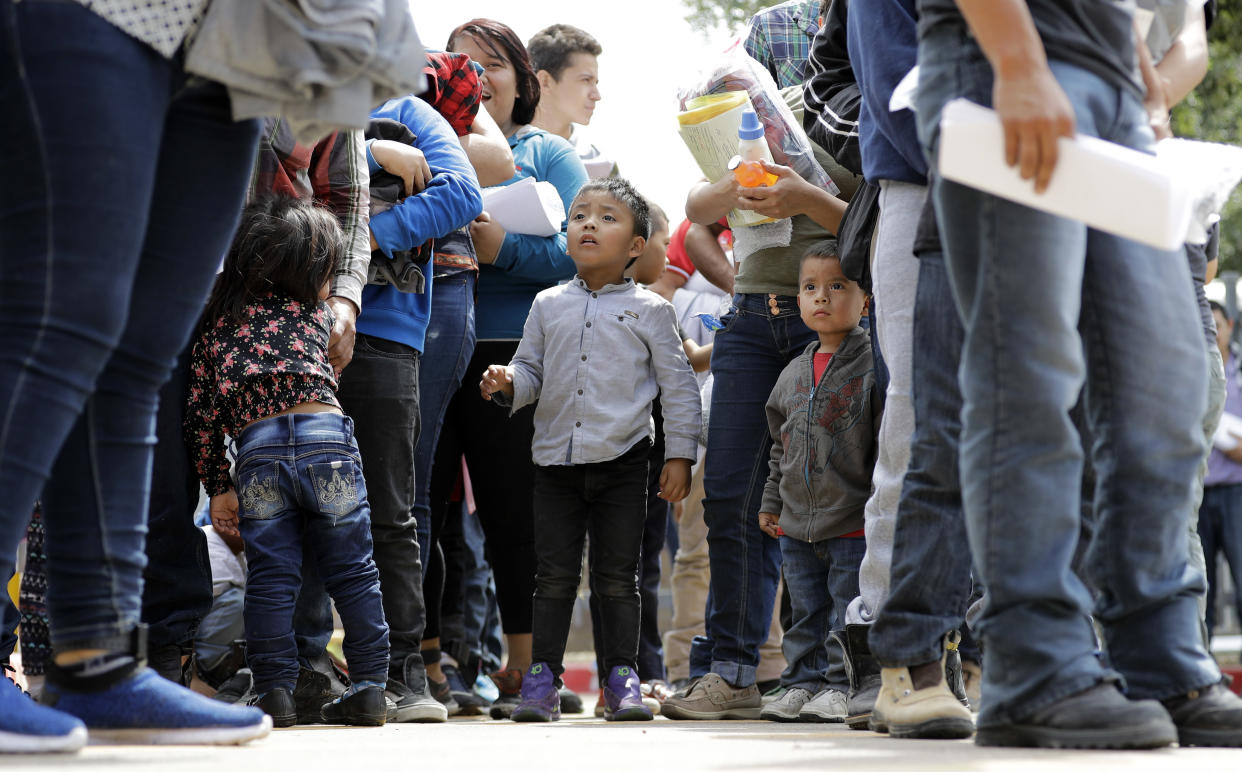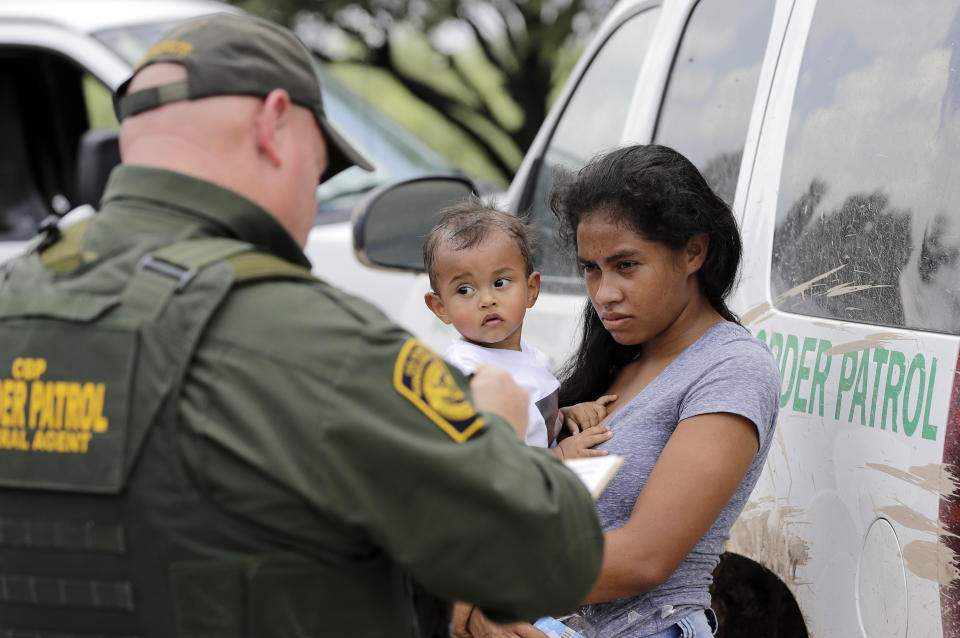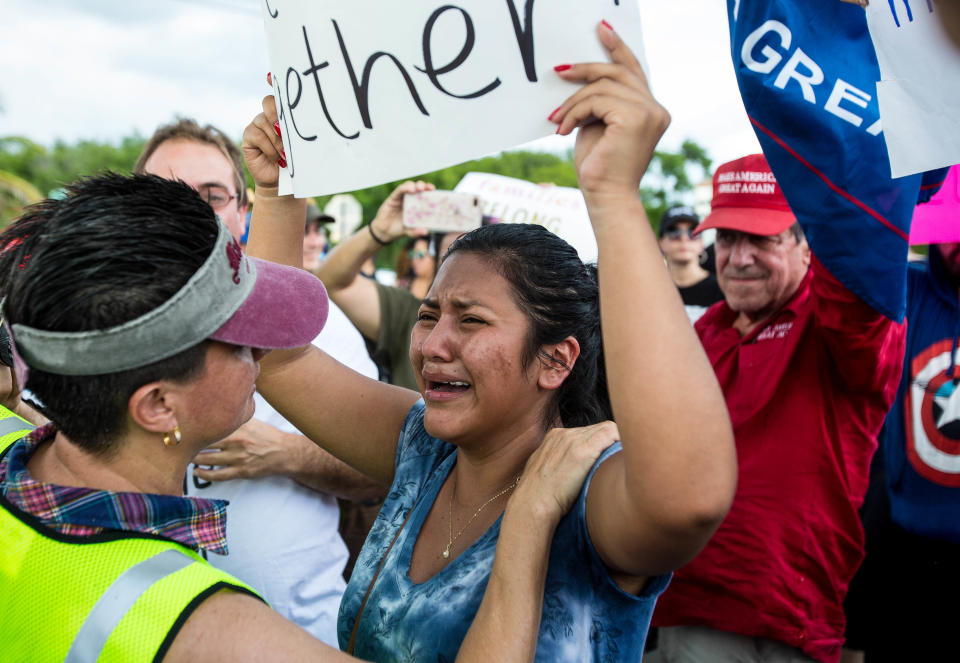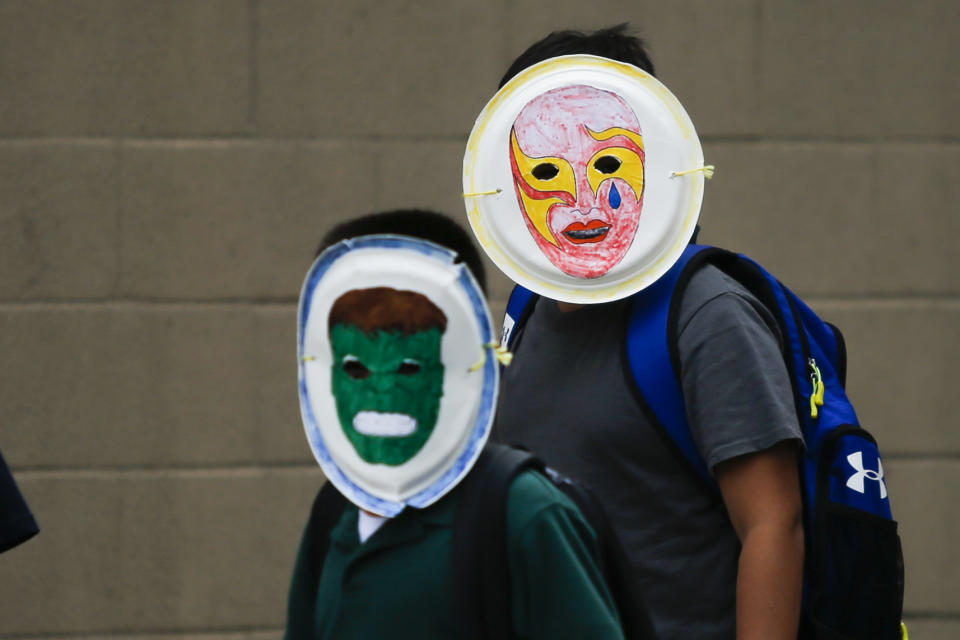How to reunite 2,000 families: The government has no clue

President Trump’s recent executive order on keeping migrant families at the southwest border together has several federal agencies scrambling to figure out how to reverse course on a policy that has already separated upwards of 2,000 children.
And the agencies that are supposed to help them are even more in the dark.
Recently published fact sheets and late-night press releases issued over the weekend have declared that the Homeland Security Department and the Health and Human Services Department have a “well-coordinated” plan to reunite thousands of families that have been separated under the administration’s previous policy. But attorneys, caseworkers and others tasked with advocating for the children caught up in this political back and forth say they’ve encountered little more than chaos and confusion since separated children — including infants — first started showing up at Office of Refugee Resettlement-funded facilities around the country in April. The president’s executive order of June 20 has only helped to complicate things even further, leaving many child advocates to question whether the administration ever intended to reunite these families.
“The short version of it: It’s a terrible mess,” said Diane Eikenberry, associate director of policy with the National Immigrant Justice Center, which provides pro-bono legal services to unaccompanied children housed in Chicago-area ORR facilities through the National Immigrant Justice Center’s Immigrant Children’s Protection Project.
“The agency that’s literally been charged by statute to look out for best interest of these children — they’re given an impossible task,” Eikenberry said, referring to the Department of Health and Human Services. “As everything with this policy, the child is the one who’s going to suffer the most.”

Minors, like adults, are not afforded a court-appointed attorney for immigration proceedings. However, under the Trafficking Victims Protection Reauthorization Act (TVPRA) of 2008, the bipartisan anti-child-trafficking law frequently derided by Trump and Attorney General Jeff Sessions as an immigration “loophole,” children who enter the country unaccompanied (“unaccompanied alien children,” or UACs) are guaranteed certain protections. In addition to requiring that unaccompanied minors be placed in the custody of HHS, TVPRA mandates that these vulnerable children have the right to a legal screening and “know your rights” presentation by an attorney who can help assure that children fleeing violence have the opportunity to apply for asylum or other forms of relief, such as Special Immigrant Juvenile Status.
That policy, for the most part, was meant to cover Central American teenagers traveling alone, usually hoping to connect with relatives already living in the U.S. But the “zero-tolerance” policy promulgated by Attorney General Jeff Sessions in April has resulted in children who crossed the border with their parents being taken away and treated as UACs. HHS officials told reporters during a briefing Tuesday that, as of June 25, there were 2,407 children in the agency’s custody “as a result of having been separated from their parents as a consequence of their parents being prosecuted under the zero tolerance policy.”
“As soon as a child is designated as unaccompanied, all those protections from TVPRA kick in,” said Jennifer Podkul, attorney and policy director at KIND (Kids in Need of Defense), another organization that provides legal assistance to unaccompanied children both while in ORR detention and after they’ve been released. “That means they can’t be put into expedited removal” — deported by administrative fiat.
Advocates for unaccompanied minors face new challenges under the Trump administration, including policies resulting in prolonged detention and increased scrutiny by DHS of minors’ parents or potential sponsors that, advocates worry, are deterring suitable guardians from coming forward.
But even experienced attorneys and child advocates have found themselves unprepared for the obstacles involved in representing this new group of clientele.
Despite the established line of communication between DHS and ORR regarding parents and relatives of unaccompanied minors, the agencies seemed unable or unwilling to share information about the separated family members in their custody.

“We have heard ORR case workers having to ask the legal service providers, ‘Can you help us find these children’s parents?’” said Eikenberry. “Which is ludicrous, because it’s the government that separated them.”
The family separations that happened prior to the signing of Trump’s executive order last week (and, based on an HHS press briefing Tuesday afternoon, may still be occurring — the information was ambiguous) were a byproduct of his administration’s zero-tolerance policy, which essentially called for the vast expansion of a longstanding program referring illegal border crossers directly to federal courts for fast-paced criminal prosecutions, most of which result in sentences of time served. Once those criminal procedures are complete, defendants enter civil immigration proceedings, where they may request a “credible fear review” — the first step to seeking asylum — and taken to ICE detention while their case is pending.
“We’re not seeing consistent policies or procedures across the board,” said Podkul, explaining that in many areas, advocates have had to launch their own case-by-case search for each child’s parent or guardian based on whatever information they can extract from DHS or the children themselves — who, depending on their age, language skills, and level of trauma, may not be in a position to communicate anything.
“Children may not know their parents actual name,” Eikenberry pointed out. “If they’re that young, they may just know ‘Mami, Papa.’ They’re not going to know phone numbers; they’re certainly not going to know birthdays of the parents [or] A-numbers,” — the alien registration number assigned to noncitizens when they are entered into immigration proceedings.
“On top of that,” she added, “we’ve definitely heard of cases where these very young children who’ve been torn from their mothers or fathers are coming into ORR custody and, because of their trauma and shock, they’re not talking.”
“It’s a real struggle,” Podkul said of helping identify the best legal pathway for these kids, adding that, for younger children in particular, “we want to make sure that the parental rights are being respected.”

While “there’s only so much you can do in terms of trying to represent a very young child in their case,” Podkul said many of the older children may have their own legitimate claims for asylum. “Even if they’re 10, 12,” she said, for “some of these kids, it’s because they were being persecuted that the family fled.”
The struggle to coordinate legal proceedings when children and their parents are detained by separate government agencies, often in different parts of the country, becomes even more difficult when the child’s parent is deported.
“It’s definitely happened, and not infrequently,” said Eikenberry. “I’m certainly aware of cases where children don’t find out until sometime after that their parents have been deported.”
The DHS was not able to provide statistics on the number of parents who’ve already been deported after being separated from their children under the zero-tolerance policy. Neither DHS nor HHS responded to questions about how children in ORR custody are notified about a parent’s deportation.
“I don’t think there is any formal notification system,” said Nithya Nathan-Pineau, an attorney and senior program director for the Detained Immigrant Children’s Program run by the Capital Area Immigrants’ Rights Coalition (CAIR) covering Maryland and Virginia. Nathan-Pineau said she knows of at least one separated child whose parent was already deported.
“That absolutely has happened,” Podkul concurred. “We have helped kids who are in ORR connect with their family who’ve already been deported.”
While Podkul said she and colleagues have been able to use to some degree the hotlines set up by ORR and ICE to facilitate communication between their child clients and detained parents, she noted that 800 numbers don’t work outside the U.S., rendering them useless for connecting with parents who’ve been removed from the country.

To track down deported parents, Podkul said KIND has been collaborating with nongovernmental organizations in the families’ home countries, particularly Guatemala and Honduras.
The U.S. government, she said, is “relying on the good will and private funds that the NGOs have to do their work for them because they haven’t done the work up front which is, you know, keeping track of the families.”
Democratic Rep. Eric Swalwell told Yahoo News his office is pressing DHS for clearer answers on deported parents.
“I’ve seen too many media reports of cases in which parents were separated from their children at the border, and then deported while their children remain somewhere in U.S. custody,” Swalwell said in a statement. “This is abominable, and I’ve seen nothing to indicate that the Trump administration has any coherent plan in place to reunite these families.”
Recent statements about reunification efforts make little, if any mention of children whose parents have already been deported. In fact, what limited details have been released on reunification efforts refer mostly to reunification for the purposes of removal which, Eikenberry argued, is “setting up situation where child and parent have to make terrible choice: be either permanently separated so the child can be safe or to be reunified into danger.”
“Attorneys across the country are struggling with this,” Podkul said. “We want parents to get their kids back, we want kids to be able to be with their parents, but once that child’s separated, we think it’s really important that the child gets a legal screening, that they know what their rights are, and understand what they’re giving up if they accept a voluntary removal.”
“We don’t want any kids to go back to harm just because the government was using them as a hostage,” she said.

_____
Read more from Yahoo News:
Stephen Miller, meet your great-grandfather, who flunked his naturalization test
From the ‘Northern Triangle’ to the Rio Grande: Violence, poverty and disasters drive migration
Civility alert: Can’t we all just get along, or even get dinner?
With DACA phasing out, college graduates face an uncertain future
Photos: Court upholds Trump administration’s so-called travel ban


